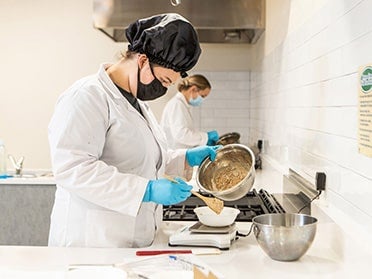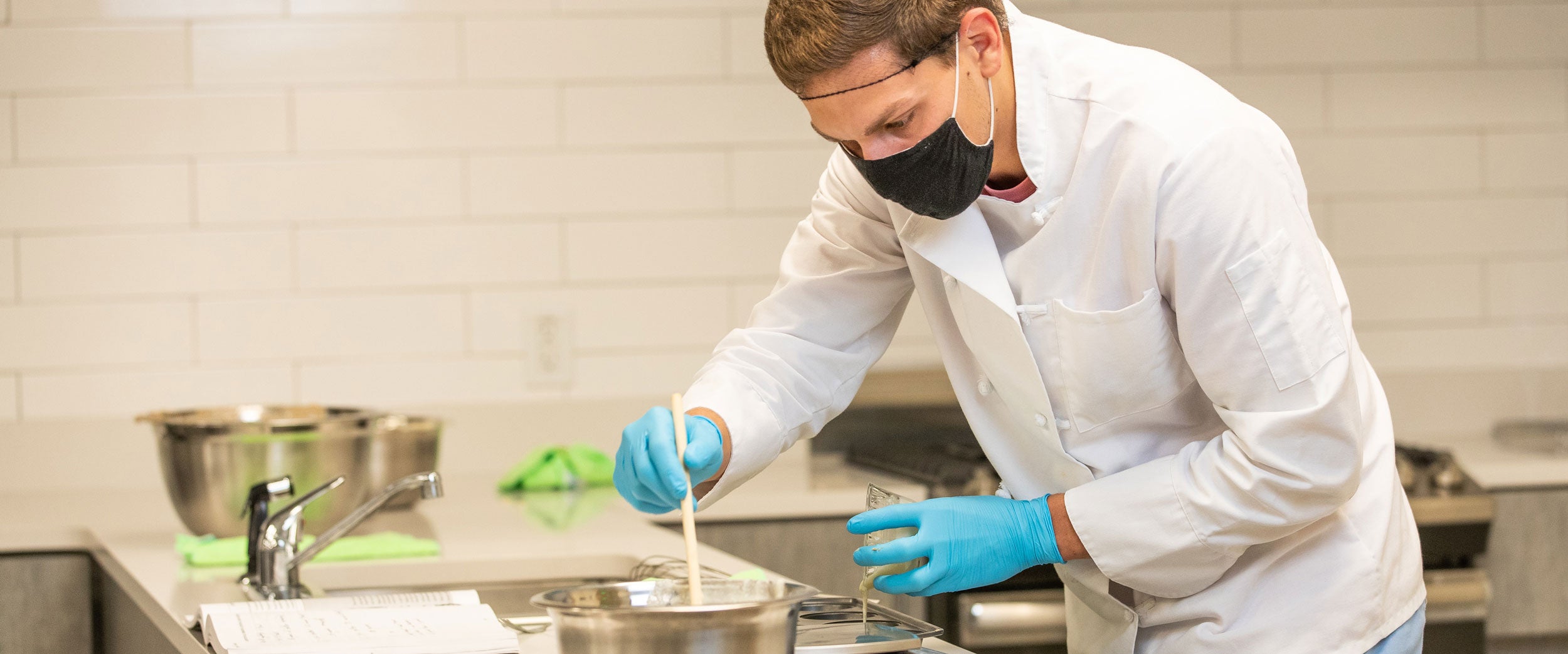Help individuals make healthier dietary choices, go into a test kitchen to create new recipes or devote yourself to community health with a Bachelor of Science (BS) in Food Science and Nutrition from Georgia Southern University.
Locations
- Statesboro Campus (In Person)
Why Major in Nutrition and Food Science at Georgia Southern?
- Work with individuals and communities or in kitchens and laboratories.
- Dietetics program certified by the Accreditation Council for Education in Nutrition and Dietetics (ACEND).
- Pursue research with faculty.
- Work toward certification as a registered dietitian.
- 124 credit hours to completion.
It’s no secret that eating well is the key to good health. As a nutrition and food science major at Georgia Southern, you’ll help people make sound, scientifically based choices when they eat and lower their risks for diseases such as diabetes, heart disease and even cancer.
Upon Completion of this Didactic Program in Dietetics, you’ll be eligible to complete an M.S. degree as well as an ACEND-accredited Supervised Practice Program, after which you’ll become eligible to take the national exam and practice as a registered dietitian. Or you could pursue a career at the community level, helping people in schools, neighborhoods and cities understand more about what they’re eating and assisting them in building better, healthier habits.
Along the way, you’ll get a firsthand perspective of your field through real-world projects, interactive labs and internship opportunities.
Ready to Apply?
What Can You Do With a Bachelor’s in Nutrition and Food Science?
Prepare for a job helping nourish others and promote food through the lens of health. Whether you do that as a registered dietitian, by developing new foods in a lab or by designing community-wide efforts depends on the path you choose. Opportunities exist in hospitals, nursing homes, schools, corporate test kitchens and other settings.
Where our graduates work:
- Business
- Community agencies
- Education
- Extension service
- Food-service operations
- Hospitals and clinics
- Industry
- Nursing homes and assisted-living facilities
- Private consulting
- Wellness/fitness centers
What our graduates do:
- Chef
- Food scientist
- Inspector, food and drug (government)
- Nutritional consultant
- Registered Dietitian Nutritionist
What You’ll Learn
The BS in Nutrition and Food Science centers around the basic sciences, including chemistry, anatomy and physiology, mathematics, microbiology and microchemistry. From here, you’ll explore nutrition in depth and pair this foundation with courses in Meal Management, Advanced Food Science, Medical Nutrition Therapy and more related topics.
See the CurriculumEmphasis Areas
Each student in the nutrition and food science program gears their knowledge to their career aspirations with one of three emphasis areas. These courses make up more than a third of the major’s requirements.
Dietetics*
Preparing for a career as a dietitian, you’ll discover the science behind eating well, and use this information to build nutritional plans specific to every person you assist. Many graduates pursue registered dietitian designations and go on to work in hospitals, wellness centers and similar settings. Learn more about the program in the student handbook for the dietetics emphasis area.
Food Science/Food Systems Administration
You’ll find a food scientist behind every “new and improved” food item on store shelves. This emphasis area leads to careers in food product development, biotechnology, quality management, food safety, compliance and food marketing.
Community Nutrition
In places where fresh, healthy food is hard to find, community nutrition experts develop education programs and other efforts to change habits on a wider scale. To design these programs, students in this emphasis area study epidemiology, statistics, sports psychology, chronic disease and more topics.
*Completion of the Didactic Dietetics Program (DPD) does not guarantee future credentialing as a registered dietitian. Graduates of the DPD must apply for and complete an M.S. degree as well as an ACEND-accredited Supervised Practice Program and pass the credentialing examination for registration as a dietitian (RD) prior to being able to practice as an RD. Acceptance into an accredited dietetic supervised practice program is fiercely competitive.
Job opportunities for graduates who ultimately obtain the RD credential are abundant in health care facilities, community wellness centers, quantity food production facilities, and food and insurance companies. The dietetics curriculum includes advanced coursework in medical nutrition therapy, metabolic nutrition, quantity food systems administration, advanced food science and community nutrition. This emphasis area is by admission.
Build Your Experience
You can’t learn to cook without getting in the kitchen — and you can’t see the individual- and population-level benefits of nutrition without hands-on experience, either.

Honors College
Students in this selective program access additional experiential learning opportunities — including participating in more intensive undergraduate research and receiving funding to travel to professional conferences.

Study Abroad
The International Studies Abroad in Health and Kinesiology class gives you a chance to learn about health, nutrition and food science while traveling to another country.

Get Involved
Invest in your future when you spend time building your network and getting involved with service projects sponsored by groups such as the Student Nutrition and Food Science Association.
Want to Learn More?
Explore essential information about our BS in Nutrition and Food Science program, including application details, accreditation status, and licensing disclosures. Gain insight into the program’s credibility and requirements to help you start your journey toward success with the knowledge you need.
Applicants to the nutrition and food science program must first gain admission to Georgia Southern.
Admission to Georgia Southern
- Create an application account.
- Complete our online application using the PIN you received after creating your application account.
- Once complete, pay the $30 application fee or upload a valid fee waiver. Previous Georgia Southern applicants and dual enrollment students do not need to pay the fee.
You can check your application status at My.GeorgiaSouthern.edu/admissions three days after completing your application. This page contains live information about your admission status, including a checklist of missing documents we need to make a decision.
Apply as a First-Year Student Transfer to Georgia SouthernAdmission to the Food Science/Food Systems Administration and Community Nutrition Emphasis Areas
Requirements for students seeking admission to the food science/food systems administration and community nutrition emphasis areas include:
- Admission to Georgia Southern University.
- An adjusted grade point average (GPA) of 2.0 or better on all coursework attempted.
- Completion of a minimum of 30 credit hours.
- A grade of “C” or better in all Area F coursework.
Admission to the Dietetics Emphasis Area
Requirements for students seeking admission to the Didactic Program in Dietetics include:
- Admission to Georgia Southern University.
- Complete a minimum of 45 credit hours.
- Achieve a minimum total overall institution GPA of 3.0 or better:
- All institutions attended are considered in the GPA.
- Completion of the following courses with a “C” or better grade or current enrollment in:
- ACCT 2030
- CHEM 1211K
- KINS 2531/2511
- NTFS 2514
- NTFS 2534
- NTFS 3534
- STAT 2231
- Submission of Dietetics Emphasis application (PDF).
- Students transferring in from an Accreditation Council for Education in Nutrition and Dietetics (ACEND)-accredited Didactic Program in Dietetics from another school are required to have their transcript(s) evaluated by the Didactic Program in Dietetics (DPD) Director, who is responsible for determining which dietetics courses remain to be taken and which dietetics courses receive transfer credit. Adequate time must be allowed for scheduling, review and notification. Students from other institutions are bound by admission and progression requirements of the Dietetics program at Georgia Southern.
The Didactic Program in Dietetics (DPD) is accredited by the Accreditation Council for Education in Nutrition and Dietetics (ACEND):
Accreditation Council for Education in Nutrition and Dietetics (ACEND)
120 South Riverside Plaza
Suite 2190
Chicago, IL 60606
1-800-877-1600
To become a registered dietitian nutritionist, a path of higher education is a must, as well as a dietetic internship from an ACEND-accredited program and passing the national registration examination. The exam requirements are set by the Commission on Dietetic Registration (CDR).
The Georgia Southern University Didactic Program in Dietetics provides you the opportunity to complete the required ACEND-accredited Didactic Program in Dietetics and a bachelor’s degree. You’ll receive a verification statement indicating this completion. (Step 1 in the five-step process outlined below).
The 5 Steps:
- Maintain continuing education.
- Complete bachelor’s and master’s degrees and receive a verification statement from an Accreditation Council for Education in Nutrition and Dietetics (ACEND)-accredited program (Didactic Program in Dietetics).
- Complete an ACEND-accredited supervised practice dietetic internship program or Individual Supervised Practice Pathway of at least 1,000 hours. Supervised practice/experiential learning can also be combined with coursework in options such as: a Coordinated Program, a Future Graduate Program or an International Dietitian Education Program.
- Pass the Commission on Dietetic Registration’s dietetic registration exam.
- Gain licensure in your state of practice. In the State of Georgia and in many other states, you must hold a valid license issued by the Georgia Board of Examiners of Licensed Dietitians in order to practice dietetics. For more information on Licensure for Registered Dietitians in the State of Georgia, visit https://www.cdrnet.org/licensure.
Related Programs

Take the Next Step
Nutrition and food science experts give people the tools to eat better and stay healthier. Contact us to learn more.
Contact Us
Joelle Romanchik-Cerpovicz, Ph.D., RD
Program Director and Associate Professor of Nutrition and Food Science
Office: Statesboro Campus-Hollis 1128B
Phone: 912-478-1420
Email: jromchik@georgiasouthern.edu

